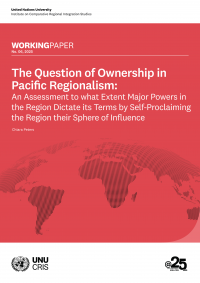The Question of Ownership in Pacific Regionalism: An Assessment to What Extent Major Powers in the Region Dictate its Terms by Self-Proclaiming the Region their Sphere of Influence

This paper contributes to the literature on Pacific Regionalism. More specifically, I analyzed four major powers (Japan, China, the European Union, and the United States) that perceive the Pacific as their sphere of influence. Thereby, I problematized (negative) influences of major powers’ engagement in the Pacific region on Pacific Island Countries’ ownership of Pacific Regionalism. By also analyzing Pacific Island Countries themselves, I established their responses to potential compromises to ownership of Pacific Regionalism.
This paper is based on the research I conducted for my master’s thesis which was submitted in partial fulfillment of the requirements for the degree Master of Science in Political Science: European and International Governance at the Vrije Universiteit Brussel.
The research is undergirded by a qualitative research design involving scrutinizing high-level political speeches, reports, strategies, plans, leaders’ communiqué, leaders’ decisions, and declarations applying Discourse-Historical Analysis. I analyzed these texts under the following five concepts: (Ideologically driven) power structures, identity, ownership, decentralization, and empowerment.
The following main findings were made:
- Japan does not negatively influence Pacific Island Countries’ ownership of regionalism.
- China and the United States have a considerably negative influence on the ownership of regionalism.
- The European Union’s discourse is complex speaking to compromises to ownership under power and identity but not under decentralization and empowerment.
Considering these sub-conclusions for each major power, I found that Pacific Island Countries’ ownership of Pacific Regionalism is considerably negatively influenced by major powers’ engagement in and with the region. The main policy conclusion of this research project therefore is to sensitize the international community towards a more nuanced engagement in and with the region.
